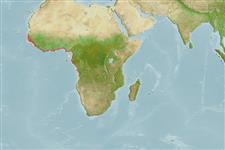Teleostei >
Gobiiformes (Gobies) >
Oxudercidae (Mudskippers) > Periophthalminae
Etymology: Periophthalmus: Greek, peri = around + Greek, ophthalmos = eye (Ref. 45335).
More on author: Linnaeus.
Environment: milieu / climate zone / depth range / distribution range
生態學
海洋; 淡水; 半鹹淡水 礁區魚類; 非產卵性溯降河的 (Ref. 51243). 熱帶; 25°C - 30°C (Ref. 1672); 21°N - 18°S, 18°W - 14°E
Africa: West-African coast, from Senegal to Angola (Ref. 57403, 79590), including most offshore islands - Macias Nguema, São Tomé, and Principe islands (Ref. 10814). Also reported from Mauritania (Ref. 5377). Western Central Pacific: Guam (Ref. 35720).
Reports from India (Ref. 29108), Thailand (Ref. 37773), Bangladesh (Ref. 39989), Philippines (Ref. 6956) and Australia (Ref. 38544) need confirmation.
非洲: 塞內加爾到安哥拉 (參考文獻 7390), 包括大多數的離岸島嶼 - Macias Nguema ,聖多美與普林西比島島.(參考文獻 10814) 中西太平洋: 關島.(參考文獻 35720)
Length at first maturity / 大小 / 重量 / 年齡
Maturity: Lm 9.6, range 8 - ? cm
Max length : 14.7 cm SL 雄魚/尚未辨別雌雄; (Ref. 79590)
背棘 (總數): 11 - 15; 背的軟條 (總數): 10-13; 臀棘 1; 臀鰭軟條: 8 - 10. Diagnosis: large adult size, approaching 150 mm SL; head width 15.4-21.8% SL (Ref. 5218). Upper lip covered by a skin fold; anterior nostrils conical and tubular, reaching to level of lower lip; posterior nostrils small, slit-like (Ref. 57403, 79590). Snout deep (Ref. 3657). Mouth horizontal (Ref. 3657), large, its gape extending to below center of eye (Ref. 57403, 79590). Eyes protruding and close together with lower eyelid fold (Ref. 3657). Predorsal scales extending anteriorly to level of hind margin of eye; upper margin of operculum, preoperculum and sub-/infraorbital regions, as well as pectoral-fin bases, covered with small, cycloid scales; 86-107 scales in longitudinal series (including usually 3 or 4 scales on caudal fin base) (Ref. 5218, 57403, 79590). First dorsal fin high (Ref. 3657), with 10-14 spines (Ref. 57403, 79590) that are flexible (Ref. 3657). Second dorsal fin with 1 spine and 10-13 soft rays (Ref. 57403, 79590), its base longer than the distance from end to caudal fin origin (Ref. 3657), length of 2nd dorsal fin base 20.9-24. 1 %SL (Ref. 5218). Length of anal fin base 14.1-17.7% SL (Ref. 5218). Pectoral fins with a long muscular lobe (Ref. 3657). Pelvic fins joined by a transverse membrane connecting the bases of the 5th pair of segmented rays (Ref. 57403, 79590). Pelvic fin length 14.2-16.0% SL; no frenum uniting pelvic fins (Ref. 5218). Caudal fin asymmetrical, upper ray longest (Ref. 57403, 79590), lower rays shorter and stout (Ref. 3657). TRDB 20-34 (Ref. 5218).
Coloration: in life: fish olive-green or rusty-brown dorsally, paler ventrally; small, blue ocelli scattered over flanks and dorsum, and some oblique, black bands may be present on dorsal part of flanks (Ref. 57403, 79590). 1st dorsal fin is dark on its anterior margin and has a bright blue longitudinal band near its distal margin; 2nd dorsal fin has 2, narrow, bluish-white longitudinal bands on its upper half (Ref. 57403). Anal fin pale or white, and sometimes slightly mottled with fine, dark spots (Ref. 79590). Pectoral fins dark on outer (lateral) surface, with pale distal margins, and lighter on inner (medial) surface, particularly ventrally; pelvic fins whitish on ventral surface but darker on dorsal surface, with pale margins; caudal fin dark (Ref. 57403, 79590). Preserved specimens: dark brown/violet on head, dorsum and flanks; chin pale or mottled gray; ventral body surface pale whitish-yellow (Ref. 57403, 79590). 1st dorsal fin grayish with a black band near distal margin, bordered dorsally and ventrally by a narrow white band; 2nd dorsal fin with a brown margin and a black stripe running along upper portion of fin, this stripe bordered dorsally and ventrally by a narrow white band (Ref. 57403). Anal fin pale or white (Ref. 57403), sometimes slightly mottled with fine, dark spots (Ref. 57403). Caudal fin dark brown on its dorsal part, whitish on its ventral part (Ref. 57403).
眼以低的眼瞼摺層伸出而且靠攏在一起; 深地的吻; 嘴水平的。 兩個分開的背鰭, 第一個高的, 藉由 11根柔韌有彈性的棘, 第二個低的, 它的基底長度超過從末端到臀鰭起點的距離; 胸鰭有一個長的肌肉葉; 腹鰭越過基底聯合了; 尾鰭有低的鰭條短, 與矮胖的。 色彩是褐色的有斜深色的橫帶,腹面顏色淡的; 背鰭具有一個寬的末梢部的縱向深色條紋與灰白的邊緣。
Facultative air-breathing (Ref. 126274); Found on muddy substrates and in brackish waters of estuaries, lagoons and mangrove swamps (Ref. 79590). Occasionally found in freshwater, but always close to the shore (Ref. 57403, 79590). Amphibious air-breather (Ref. 31184) that skips or walks on sand or mud in search of food; that is, on exposed intertidal mud flats of estuarine mangrove swamps. Adult feed chiefly on arthropods (crabs, insects, etc.) of the mud surface. Also included in the diet is the white mangrove, Avicennia nitida (Ref. 3026). Spawn in burrows (Ref. 3657). Maximum reported total length 165 mm; reports of larger specimens, up to 250 mm TL, are probably misidentifications of other species (Ref. 79590).
跳躍或行走於沙或泥以找尋食物上的兩棲的呼吸空氣的魚類 (參考文獻 31184); 在河口紅樹林沼澤的暴露在潮間帶淤泥平台上, ,那是。 成魚主要地以泥表面的節肢動物 (螃蟹,昆蟲, 等等。) 為食。 也包含在食性內是白色的紅樹林, Avicennia nitida.(參考文獻 3026) 產卵於洞穴中。 (參考文獻 3657)
Life cycle and mating behavior
成熟度 | 繁殖 | 產卵場 | 卵 | 孕卵數 | 仔魚
Probably a multiple spawner (Ref. 58481).非洲: 塞內加爾到安哥拉 (參考文獻 7390), 包括大多數的離岸島嶼 - Macias Nguema ,聖多美與普林西比島島.(參考文獻 10814) 中西太平洋: 關島.(參考文獻 35720)
Harrison, I.J., P.J. Miller and F. Pezold, 2003. Gobiidae. p. 625-666 In C. Lévêque, D. Paugy and G.G. Teugels (eds.) Faune des poissons d'eaux douce et saumâtres de l'Afrique de l'Ouest, Tome 2. Coll. Faune et Flore tropicales 40. Musée Royal de l'Afrique Centrale, Tervuren, Belgique, Museum National d'Histoire Naturalle, Paris, France and Institut de Recherche pour le Développement, Paris, France. 815 p. (Ref. 57403)
人類使用
漁業: 自給性漁業; 水族館: 商業性
更多資訊
參考文獻養殖養殖資訊品種遺傳學Electrophoreses遺傳率疾病加工NutrientsMass conversion
工具
特別的報告
下載 XML
網路資源
Estimates based on models
Preferred temperature (Ref.
123201): 25.1 - 28, mean 27.3 °C (based on 187 cells).
Phylogenetic diversity index (Ref.
82804): PD
50 = 0.5000 [Uniqueness, from 0.5 = low to 2.0 = high].
Bayesian length-weight: a=0.01072 (0.00710 - 0.01618), b=3.00 (2.88 - 3.12), in cm total length, based on LWR estimates for this species & Genus-body shape (Ref.
93245).
營養階層 (Ref.
69278): 3.2 ±0.42 se; based on food items.
回復力 (Ref.
120179): 中等的, 族群倍增時間最少 1.4 - 4.4年 (K=0.89; Fec=2,100; assuming tm= 2.5 years based on growth curve).
Fishing Vulnerability (Ref.
59153): Low vulnerability (25 of 100).
